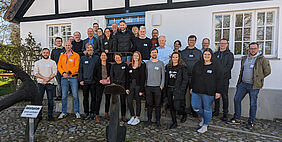Initial Situation and Task Description
In 2020, the four Baltic Sea municipalities of Baabe, Göhren, Mönchgut, and Sellin joined forces in the Mönchgut Granitz Infrastructure Company (IMG) to collectively address current challenges in tourism. Since then, a whole series of projects have been successfully implemented, such as integrating alternative mobility options, establishing a uniform tourist fee statute, and founding a joint museum society. Now the aim was to involve local people in the further development of the tourism region.
The task was to:
- Raise awareness of current challenges in tourism
- Provide a space for exchange and dialogue Identify the right levers to advance tourism across localities
- Set impulses for cooperative tourism development
The implementation of this task was to be compact and participatory. The ideal format for this: our tourism future workshop.
Concept of the Future Workshop
The basic idea of the future workshop is to focus the tourism planning process on key points and to work on them in dialogue with various stakeholders, so that agreed results are available in the shortest possible time.
- Where are we now?
- Where do we want to go?
- How do we get there?
These overarching questions were addressed through analyses and expert discussions beforehand, but especially compactly on-site in an interactive process, guided by Dr. Alexandra Partale and Karsten Palme. In this process, workshop units alternated with expert lectures, discussions, and targeted work phases with documentation phases where workshop results were prepared and processed. Through feedback from the participants, the results were reflected upon and consolidated, so that outcomes were immediately visible. Concurrently, the results were formulated into a concept so that at the end of the week, agreed results could be publicly presented.
Results of the Future Workshop
Guided by the overarching goal of harnessing the potentials of tourism for more quality of life and value creation, the following topics are to be specifically addressed in the future:
- Systematically advance sustainability
- Strengthen the sense of community and cooperation
- Promote innovations
- Advance digitalisation
- Reduce seasonality
- Make mobility more sustainable
- Strengthen businesses, and secure jobs
Concrete solutions or projects were developed and elaborated for each field of action.
The crucial aspect now is implementation.
In order to systematically advance this, goals and key performance indicators were defined. Based on this, achievement can be regularly monitored, and the process can be steered in a targeted manner.
It is now important to further strengthen the IMG GmbH as the central steering body and to consistently consolidate resources across destinations. Therefore, personnel reinforcement of the IMG team and a targeted search for further synergy potentials are key measures for further implementation. Additionally, proactive communication of results and implementation progress was formulated as a central task within the framework of implementation management, to keep the process alive and to continue to provide transparency.
